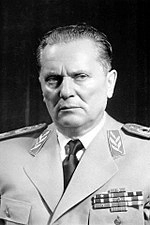How to Pronounce Josip Broz Tito
#50
Most Popular
Boost
May 07, 1892 Kumrovec, Krapina Zagorje County, Croatia Died on 04 May 1980 (aged 87)
Yugoslav revolutionary and statesman
TaurusJosip Broz Tito, Date of Birth, Place of Birth, Family, Facts, Age, Net Worth, Biography and More in FamedBorn.com

Yugoslav revolutionary and statesman
Taurus